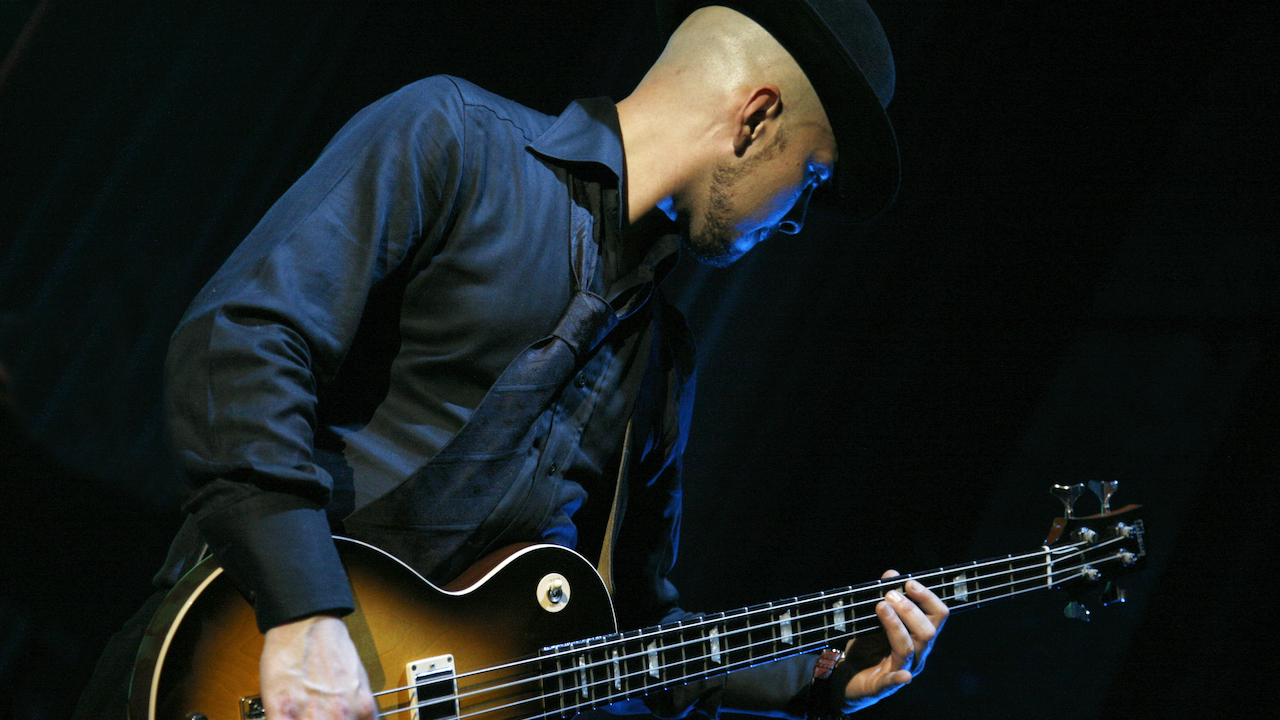Stuart Zender names the song that inspired his hallmark bassline on Jamiroquai's biggest-selling hit
“I’ve always loved Chic and Don Blackman, which is how I got the rhythm track together for Virtual Insanity”

Lauded as one of the most influential bass players to ever emerge from the UK, Stuart Zender’s bass work with Jamiroquai in the early 1990s gave rise to a new breed of bassist who continue to cite Stuart as a key influence. “It freaks me out to this day,” he says. “I was really young and I guess I was trying to show off and be a really good bass player. I'm not as flash now, but for the first three years of me being in the band I was like a kid in a candy shop.”
Jamiroquai’s 1993 debut served to highlight Zender’s funky and syncopated basslines on tracks like Too Young to Die and the title track, Emergency On Planet Earth. The album soon elevated Stuart to bass royalty. “I was really young when that album came out, but everybody wanted to know us. Guys like Gucci would come down to our shows and fit us with designer clothes; it was crazy.”
Over the next three years Jamiroquai released a further two albums, The Return of the Space Cowboy and Travelling Without Moving, which brought the group unprecedented success. “Those songs came from all of us sitting in a room playing together,” says Stuart. “We worked on Cosmic Girl at a residential studio in Milton Keynes, a place called The Manor; Derek had started that track in pre-production and I had changed the chords in the chorus.
"I was inspired by stuff like, My Forbidden Lover, and I’ve always loved that Don Blackman song Holding You, Loving You, which is how I got the rhythm track together for Virtual insanity. It's on that same vibe. The chords are different so the finished track didn’t really sound like it, but anyone who has a good ear will be able to tell you that it was inspired by Holding You, Loving You."
By this point the group’s blend of acid-jazz orientated funk had begun to absorb other elements of electronic music. Yet disputes over writing and production credits led to a series of confrontations that would ultimately lead to Stuart’s departure. “I still get royalty cheques for every song on the first three albums," he says. "But I’d give it all back to have my name printed under the tracks that I helped write and produce, which were all the big hits like Cosmic Girl and Virtual Insanity. It was a real joint effort and it should have been handled like that.”
Upon leaving the band, Stuart remained in high demand, working with the likes of Omar, Lauryn Hill, Amy Winehouse and D’Angelo. In 2006 he got the call to preside over Mark Ronson’s Version tour as musical director. “I’d already played on tracks Stop Me and Apply Some Pressure from Mark's album," says Stuart. "When the tour started out it was just myself, Mark, a guy called Snowboy and then the Haggis Horns. Then we got Pete Ray Biggin to play drums."
"We had to wear suits too, and I had sworn to myself that I would never wear a suit, but there I was onstage wearing a powder-blue suit and a cravat!"
To find out more about Stuart's current projects you can find him on Instagram.
Get The Pick Newsletter
All the latest guitar news, interviews, lessons, reviews, deals and more, direct to your inbox!

Nick Wells was the Editor of Bass Guitar magazine from 2009 to 2011, before making strides into the world of Artist Relations with Sheldon Dingwall and Dingwall Guitars. He's also the producer of bass-centric documentaries, Walking the Changes and Beneath the Bassline, as well as Production Manager and Artist Liaison for ScottsBassLessons. In his free time, you'll find him jumping around his bedroom to Kool & The Gang while hammering the life out of his P-Bass.
“One of the guys said, ‘Joni, there’s this weird bass player in Florida, you’d probably like him’”: How Joni Mitchell formed an unlikely partnership with Jaco Pastorius
“I said, ‘If I could have it my way it would sound like this,’ and I pulled the bass guitar out of the mix”: Why Prince removed the bassline from When Doves Cry













![John Mayer and Bob Weir [left] of Dead & Company photographed against a grey background. Mayer wears a blue overshirt and has his signature Silver Sky on his shoulder. Weir wears grey and a bolo tie.](https://cdn.mos.cms.futurecdn.net/C6niSAybzVCHoYcpJ8ZZgE.jpg)
